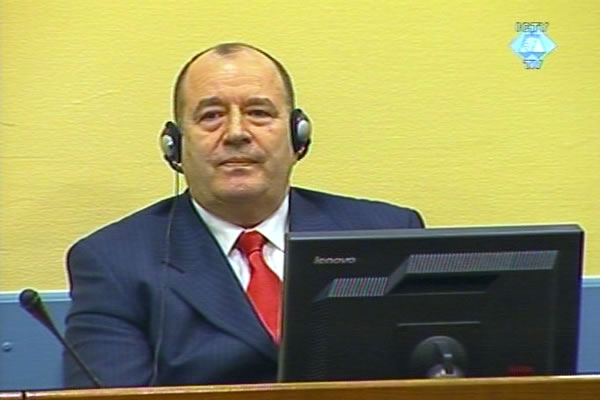Home
BOSNIAN SERB POLICE MINISTER HAS A CLEAR CONSCIENCE
In the opening statement, Mico Stanisic’s defense lawyers claim their client’s conscience is ‘clear’; the first police minister in the Bosnian Serb government ‘did more than was necessary’ to fight crime in general and prevent crimes against non-Serbs in BH in 1992 in particular
 Mico Stanisic in the courtroom
Mico Stanisic in the courtroom ‘Crimes are the last thing Mico Stanisic would justify regardless of who committed them and why. His conscience is clear’, said Mico Stanisic’s lawyer at the end of his opening statement. The defense of the first interior minister in Republika Srpska is due to begin its case. Stanisic is on trial with Stojan Zupljanin for crimes against Croats and Muslims throughout BH in 1992.
Stanisic ‘believes’ that the evidence called during the trial will be sufficient to ensure his acquittal of all charges. Defense counsel Slobodan Zecevic noted that the accused ‘is not a man capable of committing crimes the prosecution has charged him with’. The defense contends it will prove that Stanisic was not part of the joint criminal enterprise aimed at a permanent elimination of non-Serbs from the Republika Srpska, as alleged in the indictment. According to the defense, Stanisic ‘insisted on strict application of laws and regulations’ while he was working in the republic police and while he was interior minister in Republika Srpska.
In the opening statement, the defense lawyer described the character of the accused, saying that Stanisic came from a ‘poor, patriarchal family’. While Stanisic was in the police high school, he ‘studied hard and diligently’ and was elected the best student in 1973. That year, Stanisic ‘received the honor’ of being part of the birthday celebrations of President Josip Broz Tito, when he delivered the Youth Relay Baton to him on Youth Day. The defense counsel insisted on Stanisic’s tolerant attitude towards other ethnicities saying that during his schooling he shared a room with a Croat and a Muslim and ‘never expressed any nationalist feelings or animosity’.
The defense counsel dedicated most of his opening statement to the emergence and functioning of SFRY. The defense contends that knowledge of the historical context was necessary for ‘a proper understanding of the events’ in BH in 1992. The communist one-party system was based on ‘clichés of fraternity and unity’ and banned the memory of the conflicts between ethnic communities in SFRY; the most recent ones had been those from World War II. The memories were thus ‘passed on within families’ and erupted into the public sphere in 1990 when a multi-party system was introduced and when national parties were established. The insistence of the national parties on national self-awareness ‘soon turned into national intolerance and chauvinism’.
The lack of competence of the personnel who were appointed based on their ethnicity, and their lack of experience caused additional problems in BH. This, as Zecevic noted, resulted in the erosion of the judicial system and ‘impotence of the central government’ as municipalities started joining up and forming independent communities. According to the defense, the central government of Republika Srpska of which the accused was part couldn’t control local authorities. Stanisic nevertheless did ‘more than was necessary...within the limits of his power to confront every aspect of crime’, the defense argued.
The first defense witness, Andrija Bjelosevic, former chief of the Doboj police, will begin his evidence tomorrow. The defense has asked for 20 hours for his examination.
Linked Reports
- Case : Zupljanin i Stanisic - "Bosnia and Herzegovina"
- 2011-04-04 DEFENSE CASE AT THE TRIAL OF FORMER BOSNIAN SERB POLICE OFFICIALS SET TO BEGIN
- 2011-02-01 PROSECUTION CONCLUDED ITS CASE AT STANISIC AND ZUPLJANIN TRIAL
- 2011-01-24 50 DAYS OF IMPRISONMENT IN TESLIC
- 2011-05-02 DEFENSE EXPERT ON BOSNIAN SERB POLICE
- 2011-05-09 DEFENSE EXPERT: PRISON CAMPS UNDER JURISDICTION OF THE ARMY AND CRISIS STAFFS
- 2011-05-12 PROSECUTION: ‘STATISTICALLY USELESS’ FINDINGS OF DEFENSE EXPERT
